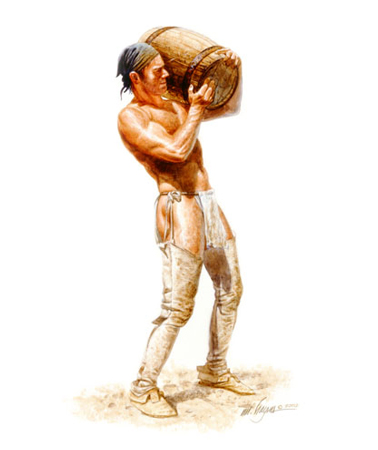Bad Start
He had gotten off to a bad start. At River Dubois camp in the winter of 1804 he built an image of himself as a thief, a liar, and a drunk. He was indifferent to rules; he had little respect for authority. He was, in contemporary terms, a dodger. Captain Clark summed him up in another, equally disparaging term, blackguard (pronounced blag-gerd)—in Webster’s earliest definition (1806), “a person of foul scurrilous language.” Besides all that, he was a slow learner. He earned 50 lashes before the Corps got away from St. Charles in late May, and his back could scarcely have healed before, at the end of June, he was sentenced to another 100 lashes for stealing whiskey and drinking on sentry duty. His name was Private John Collins. He had a lot to live down.
A Maryland resident, Collins had been serving at Fort Kaskaskia under Russell Bissell when he volunteered for duty with the Corps. He was a discipline problem during the Camp Dubois winter of 1803-1804. Clark even labeled him a “Blackgard” on an undated listing of the men and their qualifications.[1]Moulton, ed., Journals, 2:148. When he was supposed to be hunting, he sometimes visited a nearby grog shop and returned drunk. When he and another man went grouse hunting on 5 January 1804, they found part of a butchered hog hung in the woods, brought it back to camp, and claimed it was bear meat. Three days later, after Clark had sent John Shields to inquire among neighboring farmers, a French family visited Clark and claimed the hog. Clark had Collins take him to where he had found it, but the captain never recorded a resolution to the case. Collins eventually worked his way back into the captains’ good graces, enough so that in September 1805 Clark named a creek in the Bitterroot Mountains after him.
A Creek for Collins, Lolo Creek (Idaho)
View west
To see labels, point to the image.
© 2001 Airphoto, Jim Wark. All rights reserved.
The canyons cleave the deep, soft volcanic basalt until they touch bedrock. The sources of Collins Creek—called Lolo Creek since the 1860s—spring up in the mountains east of Weippe Prairie at about 5,500 feet above Mean Sea Level. The edge of the prairie at photo center is at 3,200 feet MSL; its mouth in the canyon of the Clearwater River, approximately 45 miles from its sources, is at 1,047 feet MSL. With a pause on the prairie to water the rich camas meadows, it tumbles an average ten feet per mile.
Collin’s Creek
The captains, or at least Clark, apparently saw something in him that was worth saving. On 8 July 1804, when he was no doubt still nursing a very sore back, they tested his mettle by assigning him duty as the Superintendent of Provisions for his squad, to be “immediately responsible to the commanding Officers for a judicious consumption” of daily provisions. He was also to cook for both of his squad’s messes. Like the other two superintendents, John Thompson and William Werner, he was exempted from pitching tents, collecting firewood, building scaffolds for drying meat. He was also excused from guard duty. The catch was, he was responsible for persuading other men in his squad to stand his tour for each of those duties. His buddies had showed him in two courts martial that they had little sympathy for him, so it was imperative for him to cultivate a new image for himself. In mid-October Clark appointed him as a member of the court martial of Private John Newman, who was charged with and convicted of insubordination and mutinous conduct, was flogged, and “discarded from the perminent party engaged for North Western discovery.” Collins may have played his role in Newman’s trial with mixed feelings, but he must have learned his lesson well.
Otherwise, John Collins apparently kept a low profile. While among the Lemhi Shoshones in late August 1805, Clark sent him on a short errand in the company of an Indian, which suggests Collins had at least gained some proficiency in Plains Sign Language. Otherwise, his name seldom came up in the journals any more, except as a hunter. By the middle of June he was comfortable enough with himself as well as his commanders and the rest of the Corps that he could indulge an off-beat but good-natured impulse. He presented Lewis and Clark with “Some verry good beer made of the Pa-shi-co-quar-mash bread” which “by being frequently wet molded & Sowered &c.” It seems that by the end of the expedition he had at least neutralized his place in its history; Lewis had no remarks to make about him in the personnel report he submitted Secretary of War Henry Dearborn.[2]Donald Jackson, ed., Letters of the Lewis and Clark Expedition with Related Documents, 1783-1854 (2nd ed., 2 vols, Urbana: University of Illinois Press, 1978), 366, 370n.
Collins must have been one of the six hunters Clark selected to accompany him on 18 September 1805, to “hurry on to the leavel country a head and there hunt and provide some provision” for the rest of the hungry crew. By the time they reached Weippe Prairie, Collins’s rehabilitation may have been complete in Clark’s mind, and the naming of a significant watercourse such as this one for John may have been a suitable token of his respect for the blackguard’s admirable recovery.
After the Expedition
Immediately following the expedition, Collins sold his land warrant to George Drouillard and is believed then to have partnered with Pierre Cruzatte to heading up the Missouri and join John McClellan’s trapping expedition. In 1807, that group set up a post west of the Rocky Mountains in future Montana. Of McClellan’s original forty-two men, thirty (including their leader, and probably Cruzatte) would be killed by Indians over the next three years. Collins, who was one of the survivors, may have been the man who informed William Clark about Cruzatte’s fate. His life until 1822 is unknown.
In that year, St. Louis fur trader William Henry Ashley—like Collins, in his forties—advertised for men to accompany him and “ascend the river Missouri to its source, there to be employed for one, two or three years.” Collins signed on, and may have gone with Ashley that year. In 1823, Collins was with Ashley’s party heading up the Missouri when they were confronted by some Arikaras bent on revenge after a different group of white traders killed a chief’s son and another Arikara man. Collins was among several of Ashley’s men who were killed in that attack.


